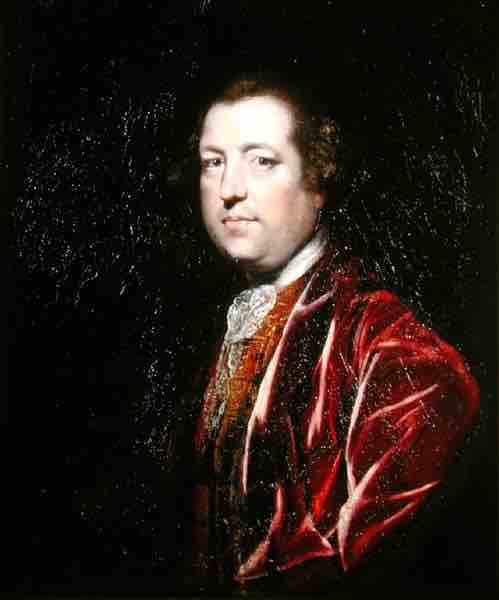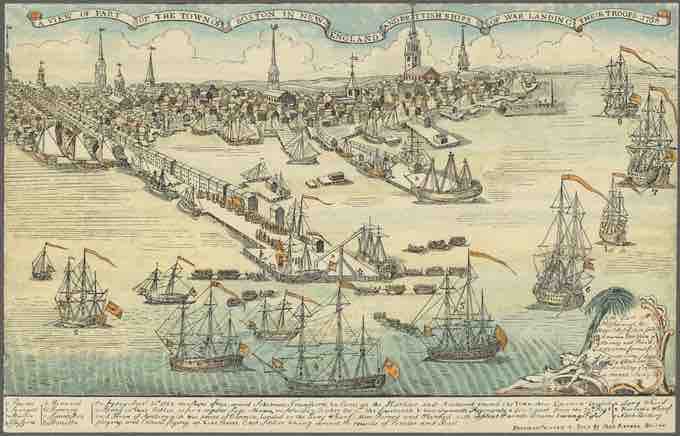The Townshend Acts
The Townshend Acts were a series of laws passed beginning in 1767, by the Parliament of Great Britain relating to the British colonies in North America. The acts are named after Charles Townshend, the Chancellor of the Exchequer, who proposed the program. Five laws are frequently mentioned that are included in the Townshend Acts:
- the Revenue Act of 1767
- the Indemnity Act
- the Commissioners of Customs Act
- the Vice Admiralty Court Act
- the New York Restraining Act
The purpose of the Townshend Acts was to raise revenue in the colonies to pay the salaries of governors and judges so that they would be independent of colonial rule. The acts were also meant to create a more effective means of enforcing compliance with trade regulations, to punish the province of New York for failing to comply with the 1765 Quartering Act, and to establish the precedent that the British Parliament had the right to tax the colonies.
Raising Revenue
The first of the Townshend Acts, sometimes simply known as the Townshend Act, was the Revenue Act of 1767. This act represented a new approach for generating tax revenue in the American colonies after the repeal of the Stamp Act in 1766. The British government thought that because the colonists had objected to the Stamp Act on the grounds that it was a direct (or internal) tax, colonists would therefore accept indirect (or external) taxes, such as taxes on imports. With this in mind, Charles Townshend, the Chancellor of the Exchequer, devised a plan that placed new duties on paper, paint, lead, glass, and tea that were imported into the colonies. These were items that were not produced in North America that the colonists were only allowed to buy from Britain. The British government's belief that the colonists would accept external taxes, however, came from a misunderstanding of the colonial objection to the Stamp Act; the colonial position was that any tax laid by Parliament for the purpose of raising revenue was unconstitutional.
The original stated purpose of the Revenue Act and the following Townshend Acts was to raise revenue to pay the cost of maintaining an army in North America. Townshend changed the purpose of the tax plan, however, and instead decided to use the revenue to pay the salaries of some colonial governors and judges. Previously, the colonial assemblies had paid these salaries, but Parliament hoped to take the "power of the purse" away from the colonies.

Charles Townshend
Charles Townshend spearheaded the Townshend Acts but died before their detrimental effects became apparent.
Reaction from the Colonies
Along with boycotts, two colonial movements, the Daughters of Liberty and the nonconsumption agreements, were created in response to British taxation. The goal of these movements was to make the colonies less dependent on British imports and other goods.
Boycotts
Merchants in the colonies, some of them smugglers, organized economic boycotts in order to pressure their British counterparts to work toward repealing the Townshend Acts. Boston merchants organized the first non-importation agreement, which called for merchants to suspend importation of certain British goods effective January 1st, 1769. Merchants in other colonial ports eventually joined the boycott. However, the non-importation movement was not as effective as promoters had hoped. The boycott movement began to fail by 1770, and came to an end in 1771.
The Daughters of Liberty
The Daughters of Liberty was a colonial American group, established around 1769, consisting of women who displayed their loyalty by participating in boycotts of British goods following the passing of the Townshend Acts. The Daughters of Liberty used their traditional skills to weave and spin yarn and wool into fabric, known as "homespun." They were recognized as patriotic heroines for their success, making America less dependent on British textiles. Proving their commitment to "the cause of liberty and industry," they openly opposed many of the British taxes and experimented to find substitutes for taxed goods, such as tea and sugar. Discoveries like boiled basil leaves to make a tea-like drink, referred to as Liberty Tea, helped lift spirits and also allowed colonists to keep traditions alive without the use of British taxed tea.
In the countryside, while patriots supported the non-importation movements of 1765 and 1769, the Daughters of Liberty continued to support American resistance. They helped end the Stamp Act in 1766. In 1774, the patriot women helped influence a decision made by the Continental Congress to boycott all British goods. The Daughters of Liberty would later have a large influence during the war. In order to support the men on the battlefield, the women made bullets and sewed uniforms, raised funds for the army, and made and circulated protest petitions.
Nonconsumption Agreements
Nonconsumption agreements were protests organized by American colonists in 1774 in opposition to the Townshend Acts. Thousands of colonists joined the resistance by signing the nonconsumption agreements, in which they stated that they would not consume or use any objects that were imported from other countries and instead would use colonial-made products in an attempt to starve the foreign companies. This led the Continental Congress to impose a suspension of all trade with Britain.
Unrest in Boston
In Massachusetts in 1768, Samuel Adams wrote a letter that became known as the Massachusetts Circular. Sent by the Massachusetts House of Representatives to the other colonial legislatures, the letter laid out the unconstitutionality of taxation without representation and encouraged the other colonies to again protest the taxes by boycotting British goods. In Great Britain, the secretary of state for the colonies—Lord Hillsborough—demanded that Massachusetts retract the letter, promising that any colonial assemblies that endorsed it would be dissolved. This threat had the effect of further uniting the colonies against the taxes.
The Massachusetts Circular got Parliament’s attention, and in 1768, Lord Hillsborough sent 4,000 British troops to Boston to deal with the unrest and put down any potential rebellion there. The troops were a constant reminder of the assertion of British power over the colonies, an illustration of an unequal relationship between members of the same empire. As an added aggravation, British soldiers moonlighted as dockworkers, creating competition for employment. Boston’s labor system had traditionally been closed, privileging native-born laborers over outsiders, and jobs were scarce. Many Bostonians, led by the Sons of Liberty, mounted a campaign of harassment against British troops. The Sons of Liberty also helped protect the smuggling actions of the merchants; smuggling was crucial for the colonists’ ability to maintain their boycott of British goods.
John Hancock was one of Boston’s most successful merchants and prominent citizens. While he maintained too high a profile to work actively with the Sons of Liberty, he was known to support their aims, if not their means of achieving them. He was also one of the many prominent merchants who had made his fortune by smuggling which was rampant in the colonial seaports. In 1768, customs officials seized the Liberty, one of his ships, and violence erupted. Led by the Sons of Liberty, Bostonians rioted against customs officials, attacking the customs house and chasing out the officers, who ran to safety at Castle William, a British fort on a Boston harbor island. British soldiers crushed the riots, but over the next few years, clashes between British officials and Bostonians became common. These clashes would eventually culminate in the Boston Massacre of 1770.

A view of the town of Boston in New England and British ships of war landing their troops in 1768
Paul Revere's engraving of British troops landing in Boston.
Partial Repeal of the Townshend Acts
On March 5, 1770—the same day as the Boston Massacre—Lord North, the new Prime Minister, presented a motion in the House of Commons that called for partial repeal of the Townshend Revenue Act. Although some in Parliament advocated a complete repeal of the act, North disagreed, arguing that the tea duty should be retained to assert the right of taxing the Americans. After debate, the Repeal Act received the Royal Assent on April 12, 1770.